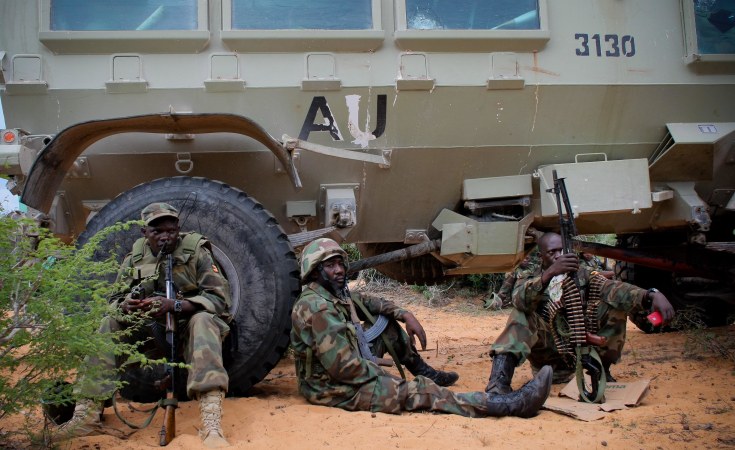The Somali government says it plans to shift military tactics against al-Shabab amid increased resistance and threats coming from the militants, senior officials confirmed to VOA Somali.
The tactic gives local community fighters the lead role in the fight against al-Shabab with federal government forces playing a supportive role, said two senior government officials who did not want to be identified.
The officials also confirmed that the federal government will register the local fighters and pay monthly stipends as an incentive for their participation, with a view to integrating them into the army in the longer term.
The national intelligence agency is tasked with leading the registration and vetting fighters to prevent infiltration of militants, officials said.
This is a return to the strategy that helped the government and local fighters seize vast areas from al-Shabab between August 2022 and January 2023.
Former national intelligence chief Brigadier General Abdirahman Turyare, who is now helping mobilize the local fighters, confirmed the tactical changes to VOA Somali in an interview.
"The current mobilization is different from the mobilization that was taking place in the past few months, which only focused on the national armed forces," Turyare said.
"The plan is to remobilize the armed forces, rest some of those soldiers who have been in the front line for a year and a half, replace them with the newly trained forces, and remobilize the Ma'awisley [local militias] and to let the local community lead the fight," he said.
The change came after a federal army-led military operation suffered a setback following a deadly al-Shabab attack on two military brigades. They had been sent deep into al-Shabab territory in the Cowsweyne village last month with the goal of capturing it.
The government has yet to confirm the number of casualties from the attack, but it is believed dozens were killed, with more than 160 injured and an unspecified number missing. A purported al-Shabab video shows a captured soldier.
The government acknowledged "mistakes" in the plan for Cowsweyne by not securing supply routes to the troops. Officials now believe al-Shabab surrounded the troops immediately after the soldiers entered the village on August 22.
Separately, troops seized the town of Elbur from al-Shabab on August 25. But following the attack on Cowsweyne, both areas returned to al-Shabab control because government troops retreated for fear of ambush.
The retreat
The Cowsweyne attack resulted in the retreat of soldiers from other towns on the front lines as well and forced government officials to launch frantic efforts to prevent troops from abandoning all the areas taken from the militants since August 2022.
In addition to Cowsweyne and Elbur, the government troops retreated from El Dheer, Masagaway, Budbud and Gal'ad.
The retreat from Gal'ad, in particular, nearly compromised the safety of senior government officials.
On the afternoon of August 28, Somali President Hassan Sheikh Mohamud donned military fatigues and was preparing to visit Gal'ad, not knowing his soldiers were already in the process of vacating the town.
But two senior officials advised him against the trip, as the situation was fluid. The two were Mahad Salad, the director of the National Intelligence and Security Agency, and Colonel Hassan Ali Nur Shute, the chief of the military court. Salad and Shute -- sworn enemies of al-Shabab -- told the president they would travel to Gal'ad in his place to address government soldiers and encourage them to stay put, officials familiar with the matter told VOA Somali.
Around 2:20 p.m., a United Nations helicopter carrying 17 people, including the two officials, two state media journalists and armed bodyguards, flew from Dhusamareb, where the president had set up a temporary base to monitor operations, to Gal'ad.
As soon as the helicopter took off, officials in Dhusamareb learned that all government troops had left Gal'ad.
Officials sent frantic phone calls and text messages warning those on board the helicopter to turn around immediately. Those on board received the warning as the helicopter was making its descent.
"Don't land," said one text message sent by a staffer at the presidential palace. "The town has been abandoned. Come back."
Officials relayed the messages to the crew, who told the pilot to abort landing immediately.
Dust covered the site as the helicopter ascended and headed for Mogadishu, where it arrived safely later that day.
"We were close to the ground at a distance where small arms fire could bring down the helicopter," said one passenger.
At 6:55 p.m., al-Shabab posted on Telegram that its fighters had recaptured Gal'ad.
Mohamud on Tuesday announced that his government arrested some of the officers who left the front lines, without specifying the number of officers in detention. But he said they will be tried in the government's military tribunal.
"People like you who did not desert the front lines and those who left the front line in the face of the enemy and went to Xamar [Mogadishu] or sold their weapons on the way, you will not be treated the same," he told soldiers outside the front-line town of Mahaas.
"They were arrested for a crime they committed," he said, "and they will be tried by the military tribunal according to the military code and discipline."
As the government shifts tactics, officials said they are not taking al-Shabab lightly.
"No, you don't underestimate the strength of your enemy," said Petroleum and Natural Resources Minister Abdirizak Omar Mohamed, a former internal security minister who is accompanying the president in Mahaas to mobilize his constituency.
"Al-Shabab is not the underdog here," he said. "We consider they are very much a resilient organization, very much adaptable organization, but we believe that with the public support, and with the mobilization of local communities ... the Somali government will prevail in this war against al-Shabab."


